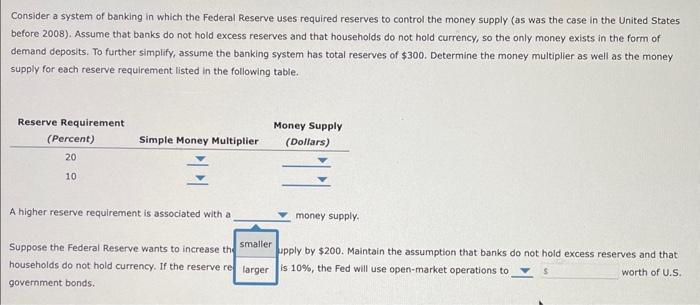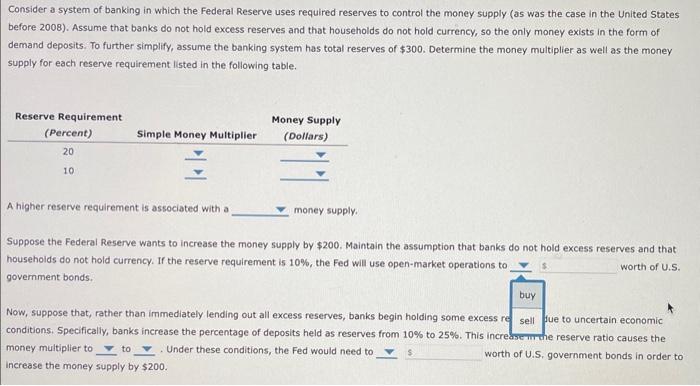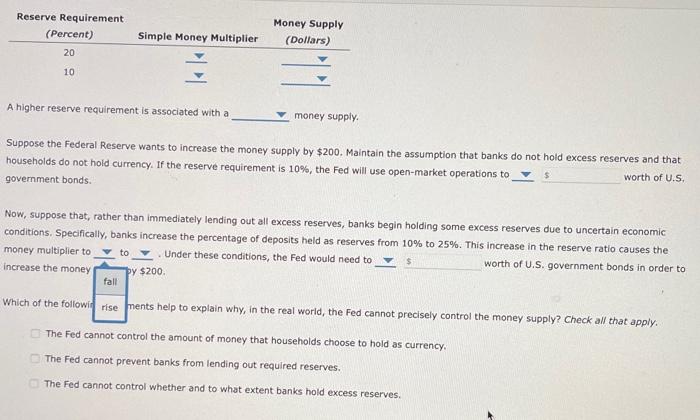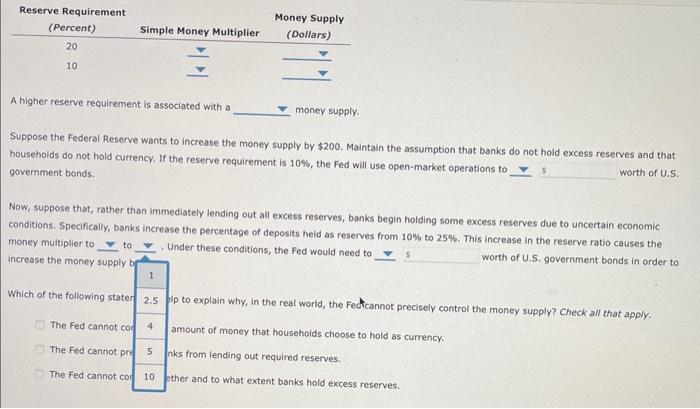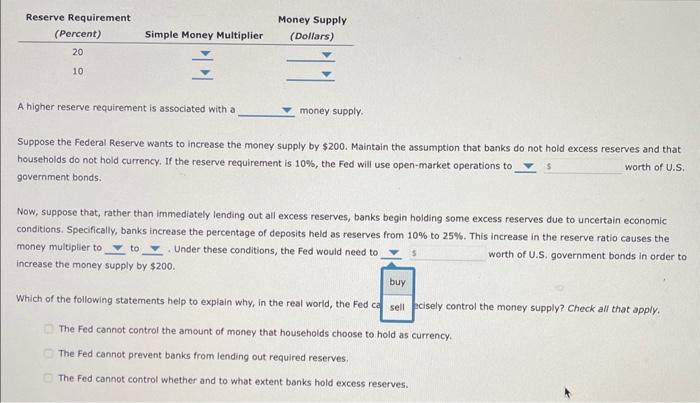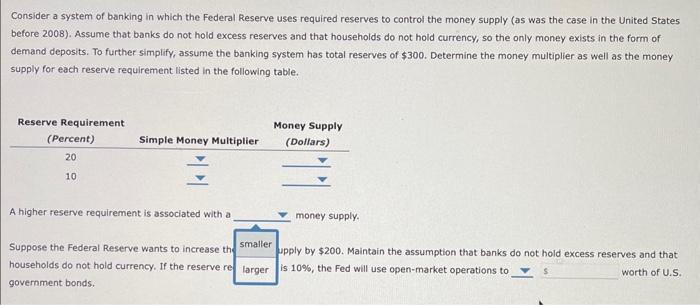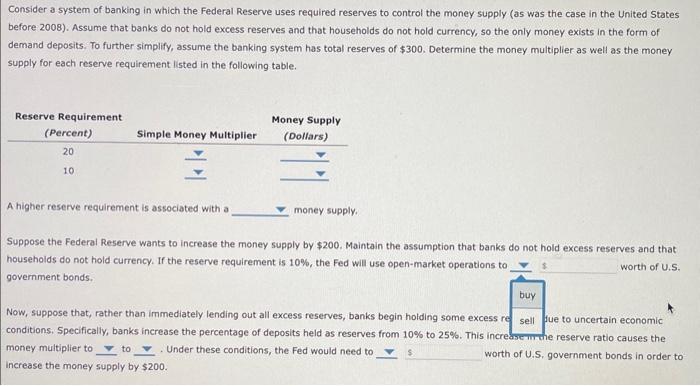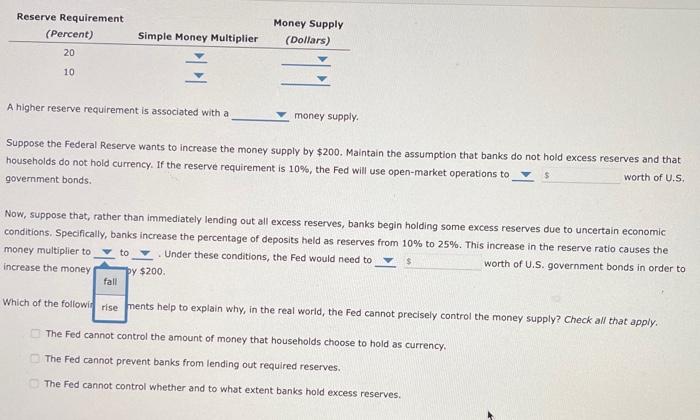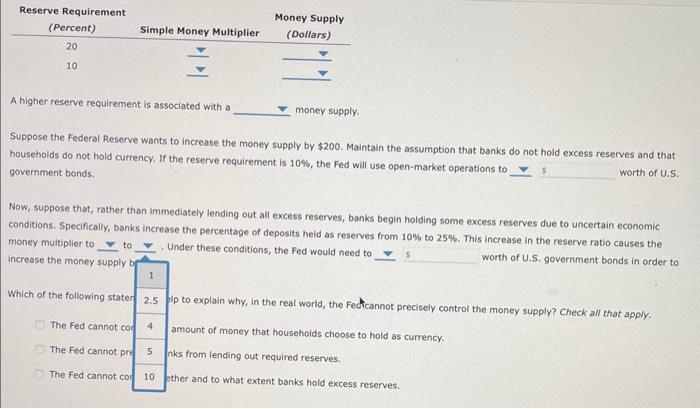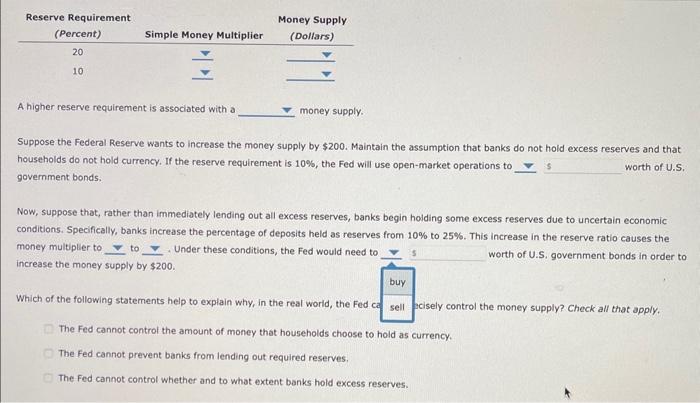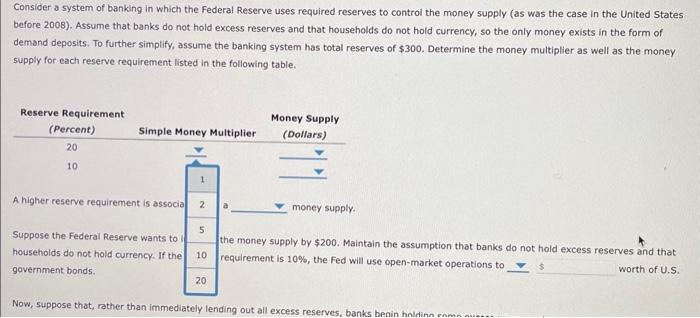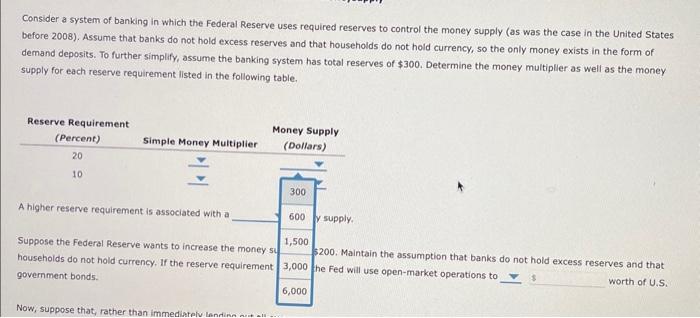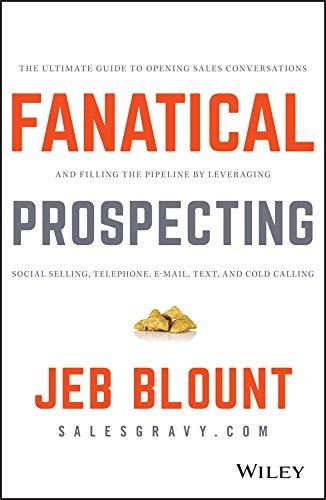Consider a system of banking in which the Federal Reserve uses required reserves to control the money supply (as was the case in the United States before 2008). Assume that banks do not hold excess reserves and that households do not hold currency, so the only money exists in the form of demand deposits. To further simplify, assume the banking system has total reserves of $300. Determine the money multipller as well as the money supply for each reserve requirement listed in the following table. A higher reserve requirement is associated with a money supply. Suppose the Federal Reserve wants to increase th upply by $200. Maintain the assumption that banks do not hold excess reserves and that households do not hold currency. If the reserve re is 10%, the Fed will use open-market operations to government bonds. Consider a system of banking in which the Federal Reserve uses required reserves to control the money supply (as was the case in the United States before 2008). Assume that banks do not hold excess reserves and that households do not hold currency, so the only money exists in the form of demand deposits. To further simplify, assume the banking system has total reserves of $300. Determine the money multiplier as well as the money supply for each reserve requirement listed in the following table. A higher reserve requirement is associated with a money supply. Suppose the Federal Reserve wants to increase the money supply by $200. Maintain the assumption that banks do not hold excess reserves and that households do not hold currency. If the reserve requirement is 10%, the Fed will use open-market operations to worth of U.S. government bonds. Now, suppose that, rather than immediately lending out all excess reserves, banks begin holding some excess ro ve to uncertain economic conditions. Specifically, banks increase the percentage of deposits held as reserves from 10% to 25%. This incre B reserve ratio causes the money multiplier to to Under these conditions, the Fed would need to increase the money supply by $200. A higher reserve requirement is associated with a money supply. Suppose the Federal Reserve wants to increase the money supply by $200. Maintain the assumption that banks do not hold excess reserves and that households do not hold currency. If the reserve requirement is 10%, the Fed will use open-market operations to government bonds. worth of U.S, Now, suppose that, rather than immediately lending out all excess reserves, banks begin holding some excess reserves due to uncertain economic conditions. Specifically, banks increase the percentage of deposits held as reserves from 10% to 25%. This increase in the reserve ratio causes the money multiplier to to Under these conditions, the Fed would need to increase the money y$200. worth of U.S. government bonds in order to Which of the followi rents help to explain why, in the real world, the Fed cannot precisely control the money supply? Check all that apply. The Fed cannot control the amount of money that households choose to hold as currency. The Fed cannot prevent banks from lending out required reserves. The Fed cannot control whether and to what extent banks hold excess reserves. A higher reserve requirement is associated with a money supply. Suppose the Federal Reserve wants to increase the money supply by $200. Maintain the assumption that banks do not hold excess reserves and that households do not hold currency. If the reserve requirement is 10%, the Fed will use open-market operations to government bond 5 . worth of U.S. Now, suppose that, rather than immediately lending out all excess reserves, banks begin holding some excess reserves due to uncertain economic conditions. Specifically, banks increase the percentage of deposits heid as reserves from 10% to 25%. This increase in the reserve ratio causes the money multiplier to to Under these conditions, the fed would need to increase the money supply bf Which of the following stater 2.5 yp to explain why, in the real world, the Fedcannot precisely control the money supply? Check all that apply. The Fed cannot cor 4 amount of money that households choose to hold as currency. The Fed cannot pro 5 nks from lending out required reserves. The Fed cannot cor 10 ther and to what extent banks hold excess reserves. A higher reserve requirement is associated with a money supply. Suppose the Federal Reserve wants to increase the money supply by $200. Maintain the assumption that banks do not hold excess reserves and that households do not hold currency. If the reserve requirement is 10%, the Fed will use open-market operations to worth of U.S. government bonds. Now, suppose that, rather than immediately lending out all excess reserves, banks begin holding some excess reserves due to uncertain economic conditions. Specifically, banks increase the percentage of deposits held as reserves from 10% to 25%. This increase in the reserve ratio causes the money multiplier to to Under these conditions, the Fed would need to increase the money supply by $200. Which of the following statements help to explain why, in the real world, the Fed 0 cisely control the money supply? check all that apply. The Fed cannot control the amount of money that households choose to hold as currency. The Fed cannot prevent banks from lending out required reserves. The Fed cannot control whether and to what extent banks hold excess reserves. Consider a system of banking in which the Federal Reserve uses required reserves to control the money supply (as was the case in the United States before 2008). Assume that banks do not hold excess reserves and that households do not hold currency, so the only money exists in the form of demand deposits. To further simplify, assume the banking system has total reserves of $300. Determine the money multiplier as well as the money supply for each reserve requirement listed in the following table. A higher reserve requirement is associated with a money supply. Suppose the Federal Reserve wants to increase th upply by $200. Maintain the assumption that banks do not hold excess reserves and that households do not hold currency. If the reserve re is 10%, the Fed will use open-market operations to government bonds. Consider a system of banking in which the Federal Reserve uses required reserves to control the money supply (as was the case in the United States before 2008). Assume that banks do not hold excess reserves and that households do not hold currency, so the only money exists in the form of demand deposits. To further simplify, assume the banking system has total reserves of $300. Determine the money multiplier as well as the money supply for each reserve requirement listed in the following table. A higher reserve requirement is associated with a money supply. Suppose the Federal Reserve wants to increase the money supply by $200. Maintain the assumption that banks do not hold excess reserves and that households do not hold currency. If the reserve requirement is 10%, the Fed will use open-market operations to worth of U.S. government bonds. Now, suppose that, rather than immediately lending out all excess reserves, banks begin holding some excess ri ue to uncertain economic conditions. Specifically, banks increase the percentage of deposits held as reserves from 10% to 25%. This incre B reserve ratio causes the money multiplier to to Under these conditions, the Fed would need to increase the money supply by $200. A higher reserve requirement is associated with a money supply. Suppose the Federal Reserve wants to increase the money supply by $200. Maintain the assumption that banks do not hold excess reserves and that households do not hold currency. If the reserve requirement is 10%, the Fed will use open-market operations to qovernment bonds. worth of U.S, Now, suppose that, rather than immediately lending out all excess reserves, banks begin holding some excess reserves due to uncertain economic conditions. Specifically, banks increase the percentage of deposits held as reserves from 10% to 25%. This increase in the reserve ratio causes the money multiplier to to Under these conditions, the Fed would need to increase the money y$200. worth of U.S. government bonds in order to Which of the foliowil rents help to explain why, in the real world, the Fed cannot precisely control the money supply? Check all that apply. The Fed cannot control the amount of money that households choose to hold as currency. The Fed cannot prevent banks from lending out required reserves. The Fed cannot control whether and to what extent banks hold excess reserves. A higher reserve requirement is associated with o money supply. Suppose the Federal Reserve wants to increase the money supply by $200. Maintain the assumption that banks do not hold excess reserves and that households do not hold currency. If the reserve requirement is 10%, the Fed will use open-market operations to government bonds. Now, suppose that, rather than immediately lending out all excess reserves, banks begin holding some excess reserves due to uncertain economic conditions. Specifically, banks increase the percentage of deposits held as reserves from 10% to 25%. This increase in the reserve ratio causes the money multiplier to to Under these conditions, the Fed would need to increase the money supply br worth of U.S. government bonds in order to Which of the following stater 2.5 ip to explain why, in the real world, the Fedcannot precisely control the money supply? Check all that apply. The Fed cannot cor 4 amount of money that households choose to hold as currency. The Fed cannot pre 5 anks from lending out required reserves. The Fed cannot cor 10 ther and to what extent banks hold excess reserves. A higher reserve requirement is associated with a money supply. Suppose the Federal Reserve wants to increase the money supply by $200. Maintain the assumption that banks do not hold excess reserves and that households do not hold currency. If the reserve requirement is 10%, the Fed will use open-market operations to worth of U.S. government bonds. Now, suppose that, rather than immediately lending out all excess reserves, banks begin hoiding some excess reserves due to uncertain economic conditions. Specifically, banks increase the percentage of deposits held as reserves from 10% to 25%. This increase in the reserve ratio causes the money multiplier to to Under these conditions, the Fed would need to increase the money supply by $200. Which of the following statements help to explain why, in the real world, the Fed c cisely control the money supply? check all that apply. The Fed cannot controt the amount of money that households choose to hold as currency. The Fed cannot prevent banks from lending out required reserves. The Fed cannot control whether and to what extent banks hold excess reserves. Consider a system of banking in which the Federal Reserve uses required reserves to control the money supply (as was the case in the United States before 2008). Assume that banks do not hold excess reserves and that households do not hold currency, so the only money exists in the form of demand deposits. To further simplify, assume the banking system has total reserves of $300. Determine the money multiplier as well as the money supply for each reserve requirement listed in the following table. Now, suppose that, rather than immediatelv lend Consider a system of banking in which the Federal Reserve uses required reserves to control the money supply (as was the case in the United States before 2008). Assume that banks do not hold excess reserves and that households do not hold currency, so the only money exists in the form of demand deposits. To further simplify, assume the banking system has total reserves of $300. Determine the money multipller as well as the money supply for each reserve requirement listed in the following table. A higher reserve requirement is associated with a government bonds
